 Improving Patient Safety in Occupational Therapy
Improving Patient Safety in Occupational Therapy
Anna DeMarco
 Improving Patient Safety in Occupational Therapy
Improving Patient Safety in Occupational Therapy
Anna DeMarco
Occupational Therapy Gives a Smile for Life
FLOTEC submission
The Impact of Vestibular Processing on Attention and School Performance: A case study
Dominique Blanche Kiefer, OTD, OTR/L, BCP
Transition from the IFSP to the IEP: The Changing Roles of the Occupational Therapy Practitioner in Part C vs Part B of IDEA
Pauline Kelly, OTD, OTR/L
Trends in Occupational Therapy Research and Practical Applications for Providers
Research Special Interest Section
 Establishing Fieldwork Site Objectives for Entry-Level Development
Establishing Fieldwork Site Objectives for Entry-Level Development
Christina Bertran, OTD, OTR/L, BCP, CAS
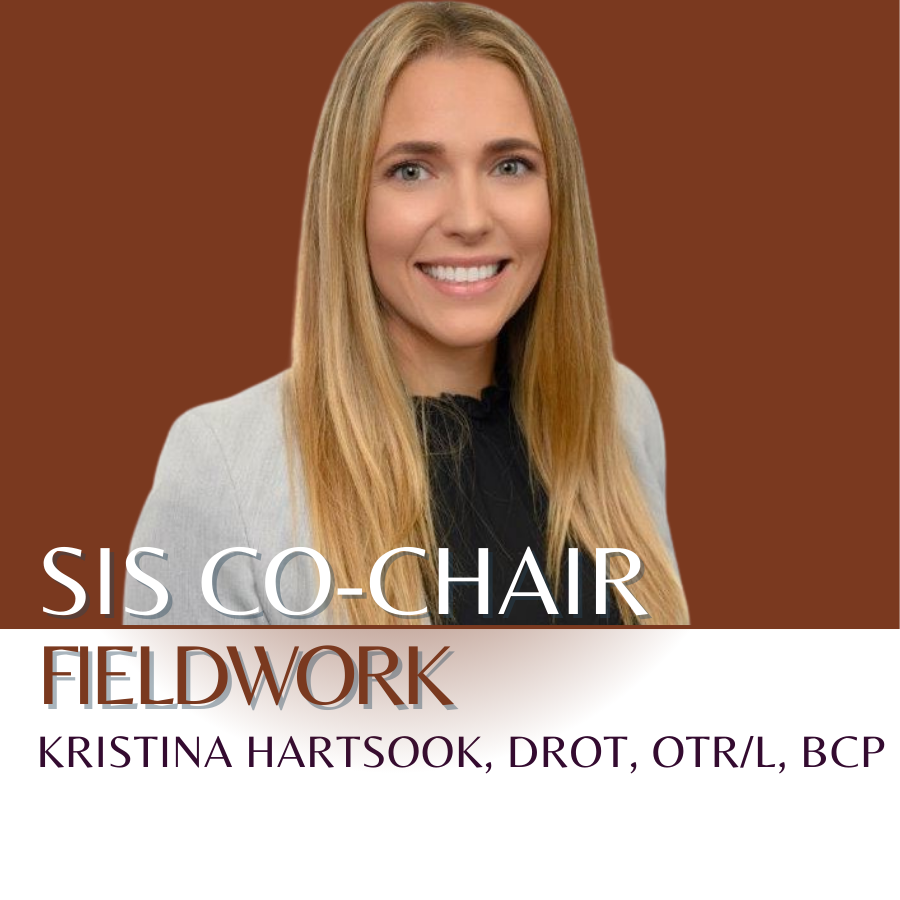 Elevating Fieldwork Experiences: The Role of Evidence-Based Practice in Occupational Therapy
Elevating Fieldwork Experiences: The Role of Evidence-Based Practice in Occupational Therapy
Kristina Hartsook, DrOT, OTR/L, BCP
Empowering students in fieldwork: Building emotional intelligence skills through self-assessment
Lucerito R. Gonzalez, COTA/L, MSOTS
Decreasing Lymph Volume With the Use of Deep Oscillation Therapy
Candice D. Young E.d.S., COTA/L, CLT
The Experiences of Siblings of Individuals with Special Needs
Kim Dudzinski, EdD, OTR/L, Mary Stein, OT-S, Veronica Sarti, OT-S, Alexis Bellacera, OT-S, & Hannah Sbacchi, OT-S
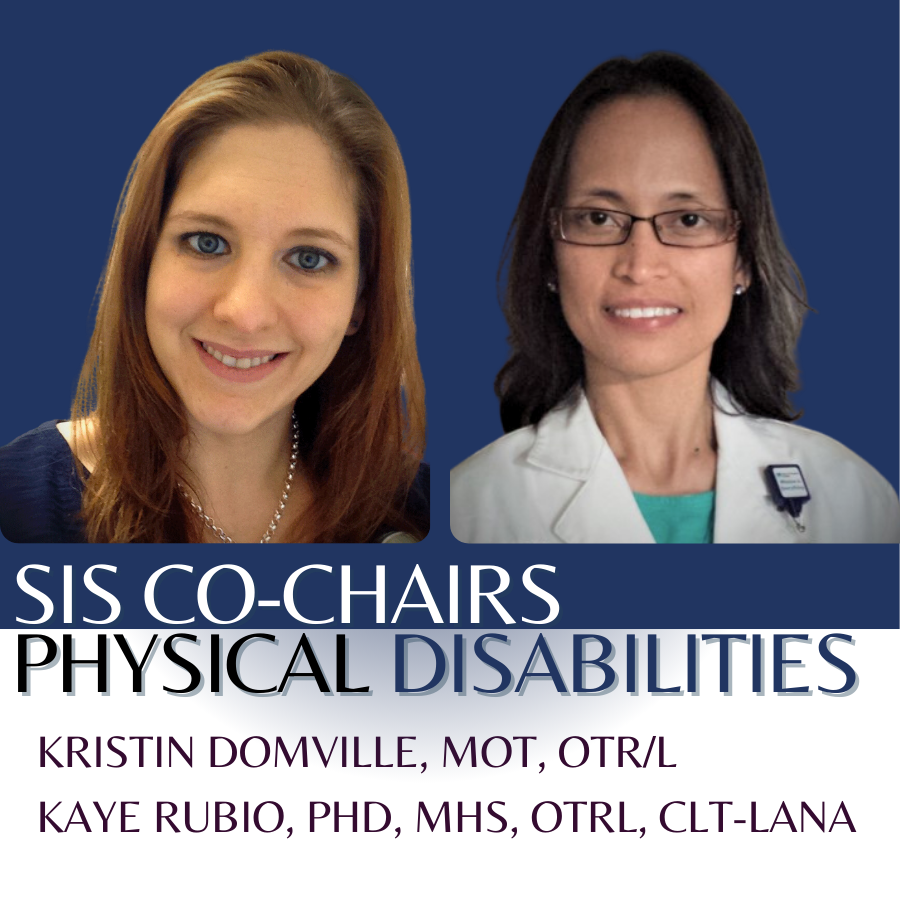 Occupational Therapy interventions to address axillary web syndrome: A debilitating side effect of breast cancer treatment
Occupational Therapy interventions to address axillary web syndrome: A debilitating side effect of breast cancer treatment
Brittany Hypes, OTD, OTR/L, CSRS, C-MLD, Kaye Rubio, Ph.D., MHS, OTR/L, CLT-LANA, & Kristin Domville, OTD, MOT, OTR/L
 Home and community health therapy services post Public Health Emergency (PHE)
Home and community health therapy services post Public Health Emergency (PHE)
Amanda Kotolski, Ph.D., OTR/L
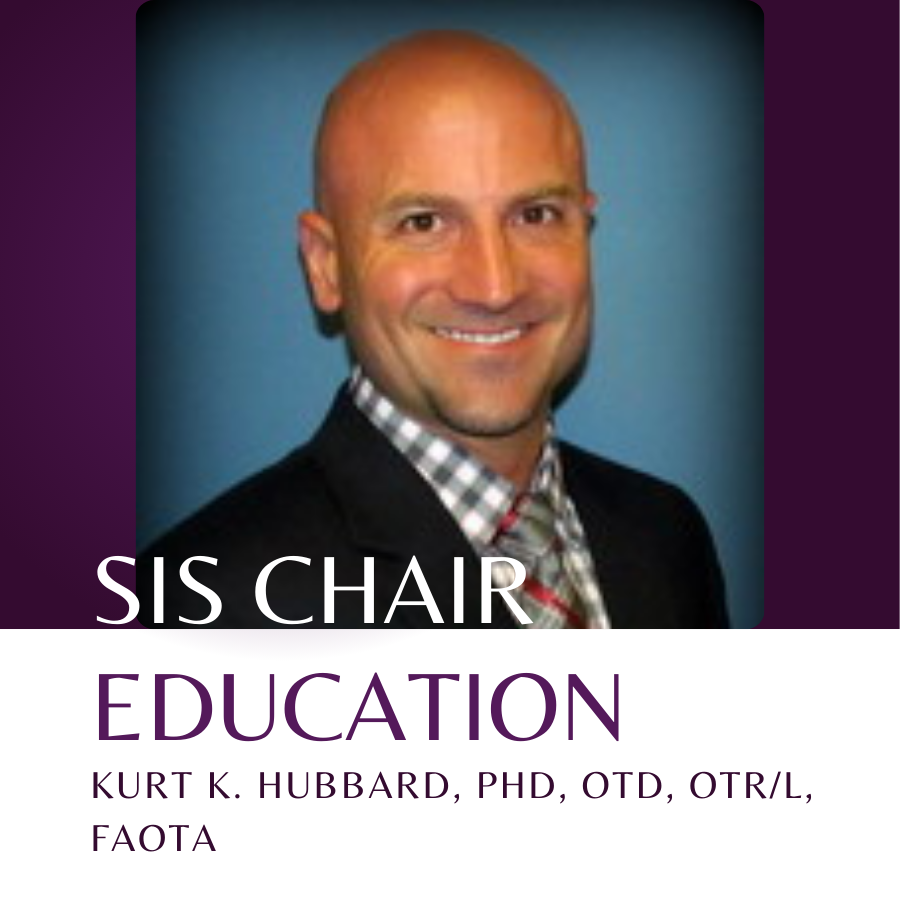 A critique of the meshing hypothesis:
A critique of the meshing hypothesis:
Using Shulman’s knowledge domain theory to facilitate effective instruction
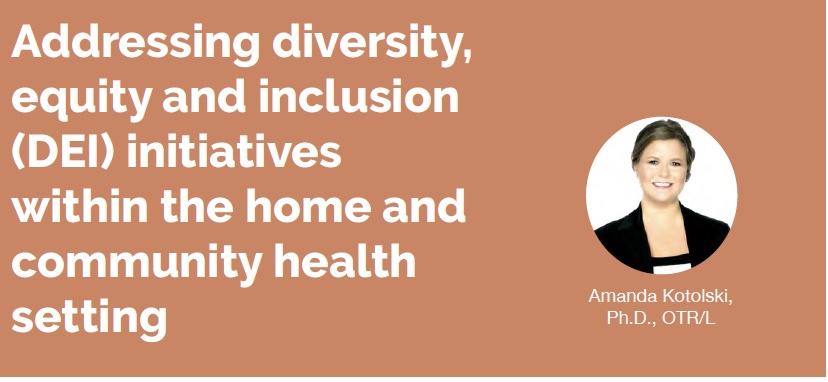
The American Occupational Therapy Association’s (AOTA’s) Vision 2025 conveys a strong commitment to diversity, equity, and inclusion (2020a). It is everyone’s right to feel welcomed, valued, included, and respected while engaging in daily life regardless of each of our own unique abilities and challenges. This statement made by AOTA supports efforts to increase diversity, equity, and inclusion (DEI) within all aspects of occupational therapy, including practice, education, and research, as well as policy development and advocacy (AOTA, 2020a). Therapist’s working in the home and community setting provides important client-centered services of which DEI principles implicitly embrace.
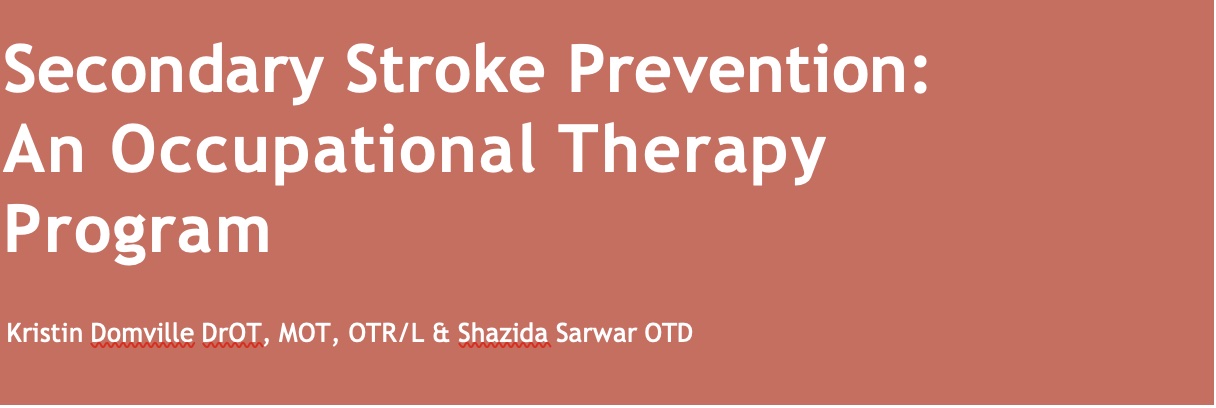
In the United States, a stroke occurs approximately 800,000 individuals annually, accounting for a large population of severe long-term disabilities (Centers for Disease Control and Prevention [CDC], 2021). In the United States, 25% of all strokes, approximately 610,000, occur among those individuals who have already had a previous stroke, raising the risks of long-term disability (CDC, 2021). NORD (2020) reports stroke recurrence leads to poorer functional outcomes, quality of life, and increased incidence of mortality. Stroke recurrence affects a large population, so reducing secondary stroke is essential to reduce mortality and disability risks.
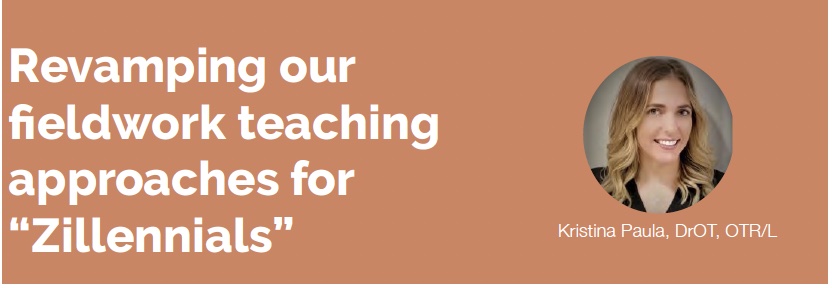
Have you ever spoken to fieldwork students and felt like it went in one ear and out the other? Well maybe because it has. Let’s take a step back and consider it from the student’s learning perspective; it is not due to their unwillingness to learn. Most universities have adopted an adult learning style to meet the learning needs of students from younger generations, however, fieldwork educators may continue to use the same teaching strategies from previous generations. As these students’ learning styles have evolved, we cannot continue to propose the same teaching styles we used 15, 10, or even 5 years ago. As occupational therapists, we adapt our therapeutic use of self to meet the individual needs of our clients. Fieldwork educators must also adjust our therapeutic use of self to enhance our interactions with fieldwork students for their learning experience.
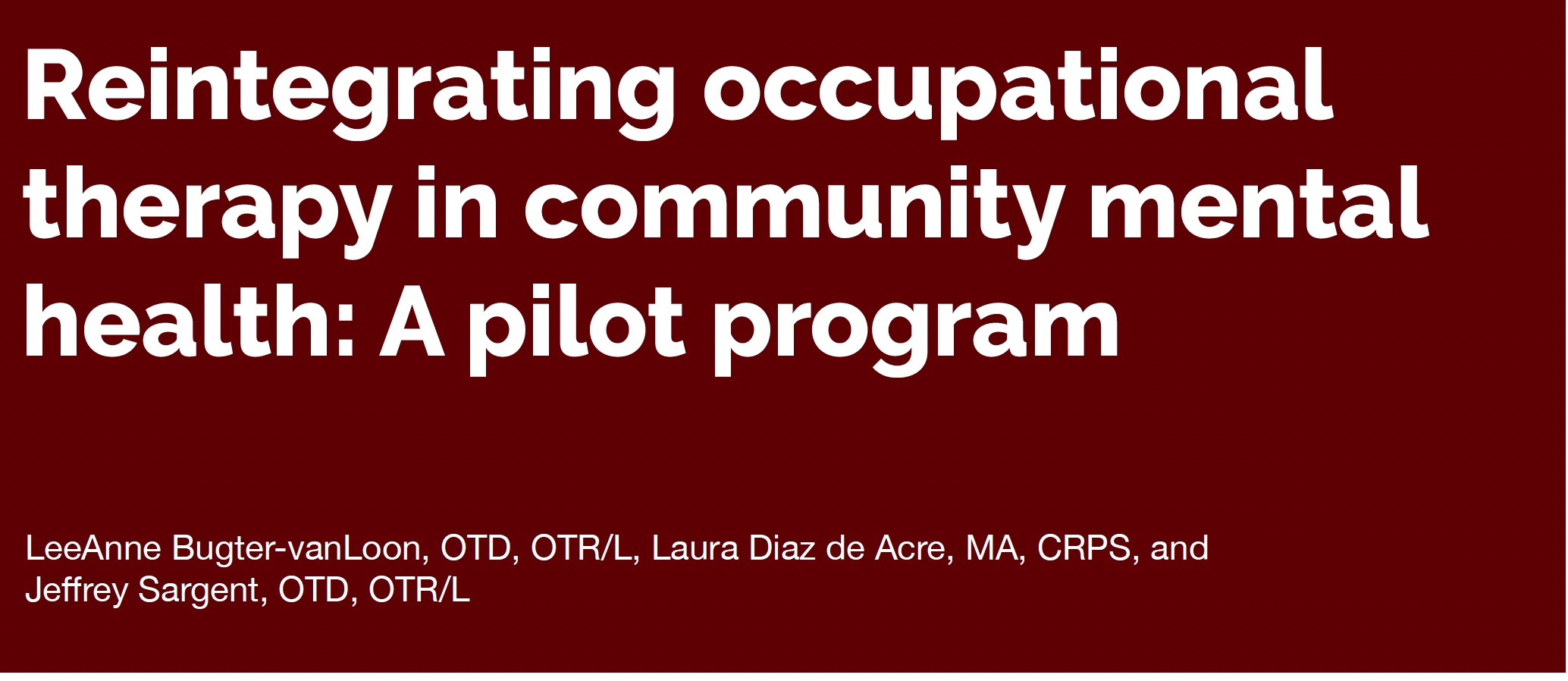
Current community-based mental health services in the state of Florida are sparse and focused on targeted areas, such as medication management, psychiatric services, trauma-based support groups, and day programming. Few programs or services facilitate community re-integration, and those that do, rely mainly on peer support services. The current continuum of care is not always able to account for the far-reaching effects of mental health and substance abuse issues and how they create obstacles to daily living and community participation. In Florida, mental health, substance abuse, and co-occurring disorder programs are under strain from a lack of funding. According to the State of Florida Appropriations Committee 2021 Annual Budget, only 7% of the allotted 3.8 billion dollars of funding to the Department of Children and Families is designated for community mental health and substance abuse services (The Florida Senate, 2022). These funds must stretch across all the programs and other related services. Funding for occupational therapy services is largely non-existent in these programs, despite a long history of treating this population. Occupational therapists (OTs) receive specialized education and clinical training to address areas within the continuum of community reintegration for clients experiencing mental health and co-occurring disorders. OTs can apply theory and conceptual models of practice stemming from a rich occupational science history to enable successful improvements in occupational participation and performance.
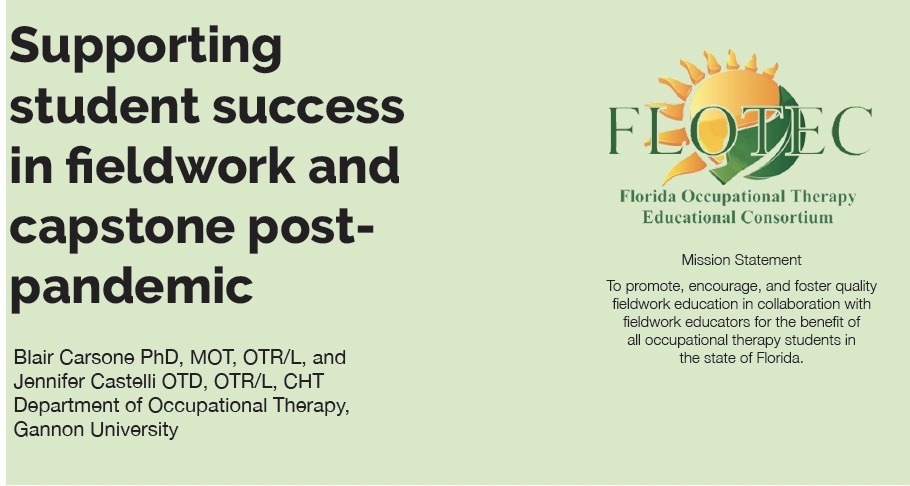
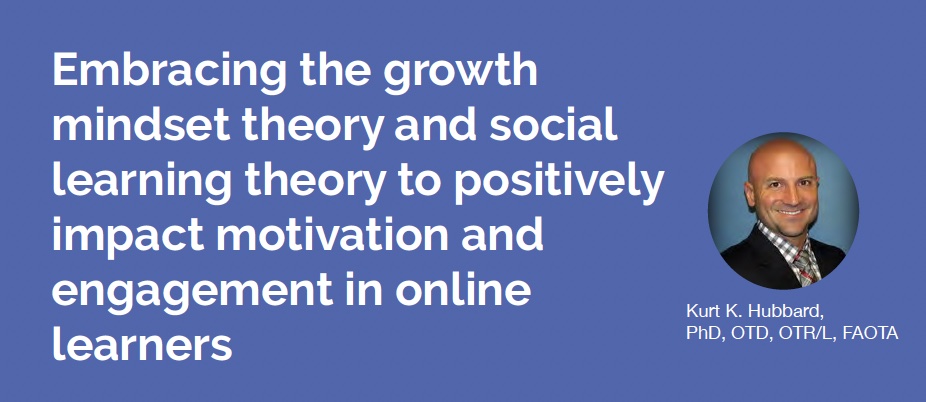
Online education refers to a learning process in which at least 80% of the course content is delivered via an online learning platform (Yeboah, Dogbey, & Smith, 2016). Hybrid education is a curriculum that has at least 50% of their delivery online. Increasingly, OT entry level programs are being delivered using hybrid curriculum. In addition, post-professional OT programs are primarily online in education delivery. According to the literature, enrollments in online education have grown rapidly in the past decade throughout postsecondary education (Jaggars, 2014). This growth offers learners opportunities, but also presents challenges for learners enrolled in online courses. For instance, despite the rapid growth in enrollment for online distance education courses, learner persistence and academic performance in online courses is often much lower than in traditional non-online courses (Croxton, 2014). Furthermore, according to Kauffman (2015), attrition rates remain high for online education courses as compared to traditional non-online distance education courses. Online education research studies have identified internal factors that lead to the underperformance for online learners (Croxton, 2014). These internal factors include lack of motivation, challenges with self-determination, and issues with not experiencing online engagement (Croxton, 2014). To this end, online college students who experience the least amount of motivation and engagement are said to be at a greater risk of dropping out (Pruett & Absher, 2015). It is of interest to identify ways the faculty can have an essential role in improving the motivation and engagement of online learners moving forward.
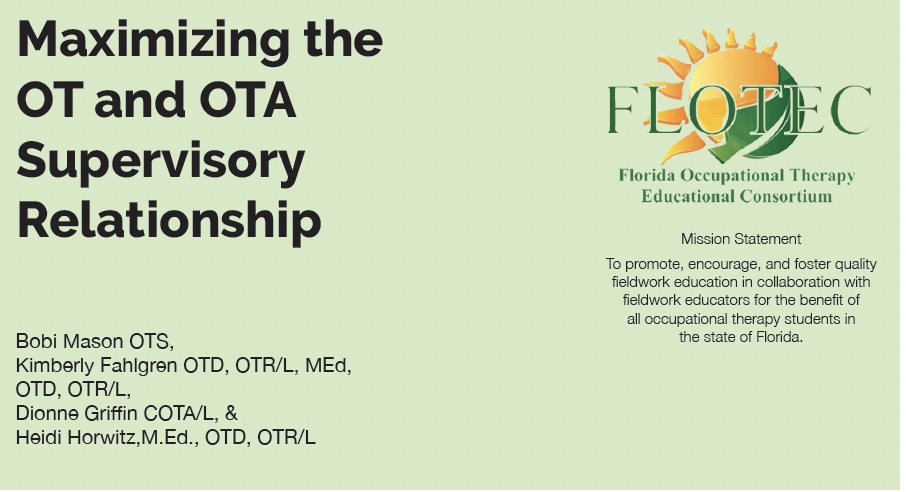
The Accreditation Council for Occupational Therapy Education (ACOTE®) standards and the Standards of Practice for Occupational Therapy identify the collaborative roles of OT/ OTA intraprofessional responsibilities (Accreditation Council for Occupational Therapy Education [ACOTE], 2018; American Occupational Therapy Association [AOTA], 2020, 2015). According to the American Occupational Therapy Association (AOTA, 2022), there are 16 occupational therapy and 20 occupational therapy assistant programs in Florida. The 2022 U.S. Bureau of Labor and Statistics Occupational Outlook Handbook reports 6,770 occupational therapists and 2,550 occupational therapy assistants licensed in Florida (U.S. Bureau of Labor Statistics, 2022). The employment rates for occupational therapy practitioners are growing exponentially, with an expected increase of 24% for OTAs and OT aides and 14% for OTs by 2031 (U.S. Bureau of Labor Statistics, 2022). With the growing demand for occupational therapy practitioners, the profession must ensure that OT and OTA students and practitioners have the knowledge and skills to promote quality supervisory and collaborative relationships to ensure best practices for our clients. This process should start in the educational environment.
Amazon searches starting from www.flota.org benefit FOTA!